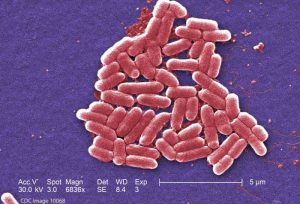The CDC has just announced the multistate outbreak of Shiga toxin-producing Escherichia coli O157:H7 infections linked to ready to eat salads sold at Trader Joe’s stores, among others. Pulsed-field gel electrophoresis (PFGE) testing has found that two ready-to-eat salads, Field Fresh Chopped Salad with Grilled Chicken, and Mexicali Salad with Chili Lime Chicken, both sold at Trader Joe’s grocery stores, are one likely source of this outbreak. The STEC O157:H7 PFGE pattern in this outbreak is new to the PulseNet database and has never been seen before, according to the CDC statement.
 A total of 26 people infected with the outbreak strain of this bacteria have been reported in three states. The case count is as follows: Arizona (1), California (22), and Washington (3). Illness onset dates range from September 29, 2013 to October 26, 2013. Ill persons range in age from 4 years to 78 years, with a median age of 28 years. Sixty-one percent of patients are female. Among 21 people who have been interviewed, six patients (28%) have been hospitalized. Two of the patients have developed hemolytic uremic syndrome, a serious complication of a STEC infection that can cause kidney failure.
A total of 26 people infected with the outbreak strain of this bacteria have been reported in three states. The case count is as follows: Arizona (1), California (22), and Washington (3). Illness onset dates range from September 29, 2013 to October 26, 2013. Ill persons range in age from 4 years to 78 years, with a median age of 28 years. Sixty-one percent of patients are female. Among 21 people who have been interviewed, six patients (28%) have been hospitalized. Two of the patients have developed hemolytic uremic syndrome, a serious complication of a STEC infection that can cause kidney failure.
Glass Onion Catering of Richmond, California has recalled about 181,620 pounds of ready to eat salads and sandwich wrap products with fully cooked chicken suspected of being contaminated with the bacteria. In addition, Atherstone Foods of Richmond, California is recalling ready to eat salads and wraps with “Best Buy” date 9/23/13 through 11/14/13 because they may be contaminated with the pathogenic bacteria.
The products are regulated by both USDA and FDA. Products regulated by USDA have the establishment number “P-34221” inside the USDA mark of inspection. You can see the full list of recalled products at both the USDA and FDA websites. Do not eat these products if you have them in your home; dispose of them immediately.
If you have eaten one of the recalled products, monitor yourself for symptoms of an E. coli infection, which include severe abdominal cramps, fever, and diarrhea, which may be bloody. Symptoms usually appear within two to eight days after exposure. If you do become ill, see your health care provider as soon as possible. A STEC infection is diagnosed with a stool sample. Symptoms of hemolytic uremic syndrome include fever, abdominal pain, pale skin tone, fatigue, irritability, small, unexplained bruises, decreased urination, and/or bleeding from the nose and mouth.




